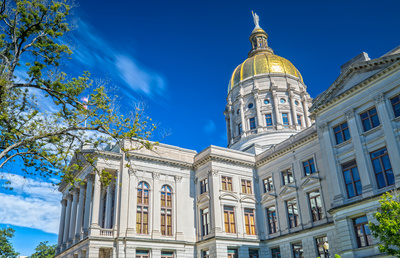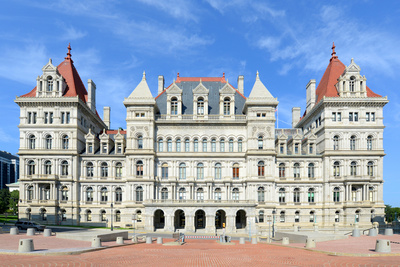Tax reform is the talk of Washington, D.C., as congressional leaders race to pass a bill before the end of the year. Whether or not they are successful could have serious downstream consequences for state efforts to adjust their tax codes. Although it's too soon to tell how these dynamics will shake out, politicians in several states have already indicated their fiscal policy goals for the 2018 session.
Connecticut
Connecticut Department of Revenue Services Commissioner Kevin B. Sullivan
announced late in November that the state will follow Massachusetts in establishing so-called “cookie nexus” rules, or sales tax nexus based on the use of in-state internet cookies. He says that this new policy will allow the state's sales tax to keep pace with the modern state of e-commerce without worrying about running afoul of the Supreme Court's current physical presence jurisprudence as laid out in
Quill Corp v. North Dakota. We will continue to watch to see if this new nexus standard proliferates, as
economic nexus legislation did this year.
Florida
Governor Rick Scott (R) has
laid out his policy priorities for the upcoming legislative session, which include establishing a 10-day back-to-school tax holiday and exempting clothes and school supplies from the sales tax. Given that he is widely expected to run for the Senate after leaving the governor's mansion, it's unlikely that Scott will want to tackle more controversial tax legislation.
Kentucky
Governor Matt Bevin (R) has
talked repeatedly this year about the need to reform the state's finances, with a particular focus on moving Kentucky toward a consumption-based model of taxation. This fall he opted to delay his tax reform plans to focus on the state's yawning pension problems, but his pension reform proposal hit
heavy opposition immediately. Legislators are now saying
they are close to a deal on pensions. If they fail, it could complicate the rest of the governor's fiscal agenda.
Minnesota
In a
two-minute Facebook video, Minnesota Senate Taxes Committee Chair Roger Chamberlain (R) called for repealing the income tax and replacing it with a more robust consumption tax (remarks which he also made to the state CPA society). Calling the income tax burdensome, abusive, and antiquated, he said that a consumption tax would not only yield more stable revenue but also attract business to the state. While Chamberlain did not provide any policy specifics, any replacement for the income tax would have to massively expand the sales tax base.
New Jersey
Governor-elect Phil Murphy (D) has already indicated that he will be setting a very different course than his predecessor, Governor Chris Christie (R). Focusing on ensuring that the state's highest earners “
pay their fair share,” Murphy has called for a new tax on millionaires and hinted that he is open to imposing mandatory combined reporting.
Oregon
Lawmakers rejected a gross receipts tax (GRT)
bill earlier this year and voters rejected a
similar policy at the polls in 2016, but there are those in the state who are hoping to take another run at it. A coalition of unions and progressive groups had backed a new ballot measure, but they withdrew a month after collecting the first round of signatures. Although we expect a GRT proposal on the ballot next November, it's currently unclear where it will come from or what it will look like.
Utah
In a move that sponsors say is meant to modernize the state's tax code, Utah lawmakers have introduced a
draft of a tax omnibus bill that would have wide-ranging implications on the state tax code. The draft's provisions include levying new taxes on downloadable (but not streaming) media, adopting market sourcing for sales under the corporate income tax, eliminating carryback for the net operating loss deduction, and changing the optional apportionment formula for business income. The full legislature will take up the bill when it convenes in January.
Washington
Democratic leaders, including Governor Jay Inslee (D), have
made it clear that since the
Democratic takeover of the Washington legislature they intend to renew their push for a
robust carbon tax. A carbon tax proposal failed by 19 points on the 2016 ballot, but progressives and environmental activists are eager to give the effort another try. It remains to be seen whether the Democratic majorities will be sufficient to enact such a novel policy.
Wisconsin
There are early indications that Wisconsin legislators are planning on taking a deep dive into tax reform in the near future. Information is still very preliminary at this point, but Wisconsin Assembly Committee on Ways and Means Chair John Macco (R)
says that he wants to usher in a “new era of economic growth” by, in part, moving away from the current income and property tax models, which he described as “out of whack.” As evidence that he's serious, his committee has created four new subcommittees dedicated to tax minutiae.
Wyoming
Although Governor Matt Mead (R) has expressed cautious optimism that the “
economic storm” that beset his state is over, the Wyoming legislature may be set to consider at least one drastic change to the state tax code in an attempt to diversify the state's revenue streams. During an interim revenue committee meeting in November, members discussed a
draft bill that would expand the sales tax base to a host of new services, including personal care, agricultural, legal, engineering, and other business services. It is unclear whether lawmakers will introduce formal legislation in this vein, but it is definitely something we will keep an eye on.



